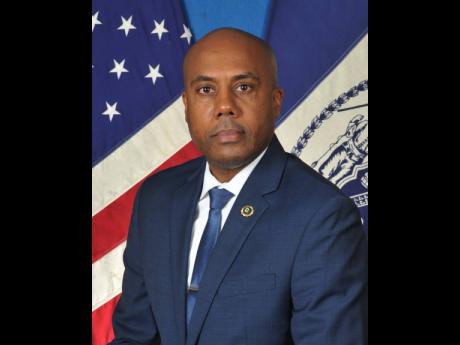No magic bullet for crime
J’can law enforcement officers in US pitch suggestions to take the beast
NEW YORK:
Law enforcement sources in the United States have outlined a number of key areas they believe Jamaica should focus on as it grapples with a high homicide rate and the continued use of the gun, many of which are sourced from overseas illegally, as the major weapon of choice in the island.
Speaking with The Sunday Gleaner last week, Jamaica-born New York Police Department (NYPD) Inspector Michael King said it was sad to see the level of crime in Jamaica and suggested that police leadership at the station level must be held accountable for implementing plans that will lead to crime reduction.
“Officers in charge of police stations must provide a crime plan on reducing crime in their areas and where such officers fail to stem the crime flow, they should be replaced,” said King, who heads the NYPD’s Special Victims Unit and has more than 700 detectives under his command.
The 22-year veteran of the NYPD added that policemen on the ground must be given every opportunity to have an input into the development of solutions to the crime problem because they have the on-the ground intelligence. This intelligence, he said, should also be shared between all police stations, departments and all other parts of the security apparatus.
“There is no short-term, quick fix to solving crime. My impression is that various Jamaican governments have always gone for quick fixes instead of implementing long-range plans to break the back of crime,” he said.
“The situation with crime in Jamaica is that it is at pandemic levels. This is unfortunate and it is sad to see. There must be significant resources given to the security forces,” he said, noting that cops should also be paid well.
Unless this is done, he said, it could lead to corruption among police officers.
The Jamaica Police Federation is currently locked in a salary dispute with the Government over unpaid overtime wages going back to more than a decade, even as they press the Government to improve its latest wage increase offer.
Its latest wage-negotiation meeting with Finance Minister Dr Nigel Clarke on Friday ended without a resolution and is set to continue at 8 a.m. tomorrow.
King, who was born in St James and attended Cornwall College, said that efforts to rein in the runaway murder figures must go beyond community policing, as while this was an option in more structured developments, it would be difficult to carry out community policing in areas where houses go up unplanned.
And calling states of emergency “a knee-jerk reaction”, he said that flooding areas with police is a temporary fix and only serves to flush criminals from the space to other sections of the island, who then return after the police presence has been reduced.
Right technological support
King said that better monitoring, aided with the right technological support, is needed to tackle the illegal gun trade from inside out, noting that guns were flowing into the island from southern United States, Haiti, Honduras and even Nicaragua.
“There is no magic bullet for fixing the crime problem in Jamaica,” he said.
Commander Armin Cate, who was with the Caribbean Anti-Terrorism Organization, said that in order for Jamaica to solve its crime problem, the island needs to end the politicising of crime, lamenting that it was often used as a political football with constant finger-pointing, charging that even statistics are sometimes skewed to politicise the problem.
The current catch-and-release system was also a part of the problem, noted Cate, as is the length of time it takes the courts to conduct trials after the apprehension of criminals.
“The main issue is that crime is taking place in poor neighbourhoods and the affluent Jamaicans are not directly affected by it and so there is no urgency to deal with it,” he told The Sunday Gleaner.
Cate, who spent 22 years as a special agent for US Homeland Security Investigations (HIS) and 34 years in the US Coast Guard, all based in the Southern Command region of the Caribbean and Latin/South America, said Jamaica has to have a system to identify and catalogue the leaders of crime and take them down.
“Take away the money and you will begin to drastically reduce crime. You will never be able to stop crime, but you can reduce it to manageable levels. You do this by following the money and cutting off this flow,” he said before echoing King’s call for the sharing of information at all levels of the national security apparatus.
Emphasising that he was not speaking on behalf of the US agencies, he urged the Jamaican authorities to make full use of all the systems and technologies offered by the United States government in its fight against crime.
The private sector in Jamaica, he said, should also be engaged in the fight against crime by utilising the Customs Trade Partnership Against Terrorism, a programme by which all cargo from Jamaica to the United States is scrutinised.
NYPD Sergeant Dawn Riley, who was born in Jamaica and has served at various areas in the police department, including internal affairs, called for more and better resources for the security forces.
Noting that corruption should be tackled head-on, she also urged the Government to pay attention to the levels of education and lack of opportunities, which could also trigger a rise in crime.
Other high-ranking Jamaicans in the NYPD were not able to comment as they did not receive clearance to speak with The Sunday Gleaner on this issue.

